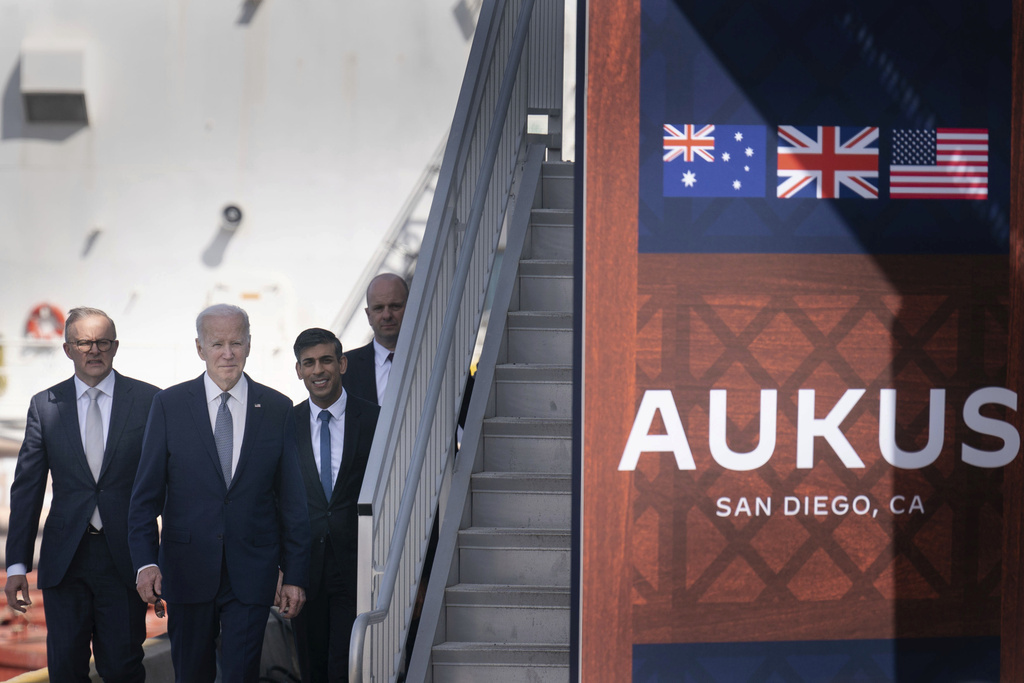The United States, United Kingdom, and Australia are considering Canada, New Zealand, and South Korea as future collaborators for the AUKUS security partnership, a senior U.S. official said Tuesday.
Australia, the U.K., and the U.S. signed the AUKUS agreement in September 2021.
Pillar I has the goal of helping Australia deploy a fleet of nuclear-powered submarines by the 2030s. Pillar II pools the talents of the collective defense sectors to “catalyze, at an unprecedented pace, the delivery of advanced capabilities.”
The AUKUS agreement has been a pivot by Washington to strengthen its presence in the Indo-Pacific regions as China’s military ambitions expand.
Specifically, President Joe Biden has sought to beef up partnerships with U.S. allies in Asia, including Japan and the Philippines, as Beijing continues to assert its dominance in the contested waters of the South China Sea.
“The AUKUS partners are considering a range of additional partners who may bring unique strengths to Pillar 2, including the [Republic of Korea], Canada, and New Zealand, in addition to Japan,” the U.S. official said in response to a question from Yonhap News Agency. “Additional partners will only be added with full consensus, however, and through a consultation process that will take some months.”

In a joint statement, the defense chiefs also underscored their confidence that “engaging like-minded partners in the work of Pillar II will only strengthen” their shared goal of delivering advanced capabilities in support of regional stability.
“All AUKUS nations have reaffirmed their commitment to take full advantage of the technological opportunities of AUKUS by combining national strengths to deepen collaboration and deliver game-changing capabilities at pace,” they added. “The AUKUS nations have bolstered efforts to break down barriers to collaboration, spur a more integrated defense industrial base and private sector partnership, and identify new opportunities for trilateral capability development.”
The secretaries in charge of AUKUS also announced new initiatives across Pillar I and Pillar II. They included a renewed commitment “to progressing Australia’s acquisition of conventionally armed, nuclear-powered submarines in a way that sets the highest non-proliferation standards,” leveraging the power of the defense industry to help Australia, establishing a submarine rotational force starting in 2027, and enabling policy changes that will establish the nuclear safety framework for Australia’s nuclear-powered submarine enterprise.
The officials also highlighted efforts to bolster industry and innovation sector collaboration and added that partners were working with “investors, private capital, and traditional and non-traditional industry to translate disruptive technology into asymmetric capability for our three defense forces.”
Earlier, the leaders had issued a joint statement highlighting the potential for working with Tokyo.
“Recognizing Japan’s strengths and its close bilateral defense partnerships with all three countries, we are considering cooperation with Japan on AUKUS Pillar II advanced capability projects,” they said.
CLICK HERE FOR MORE FROM THE WASHINGTON EXAMINER
The statement came as Japanese Prime Minister Fumio Kishida traveled to Washington for a face-to-face meeting with Biden and Philippine President Ferdinand Marcos Jr.
The Philippines has been at the forefront of tensions with Beijing in territorial disputes.
